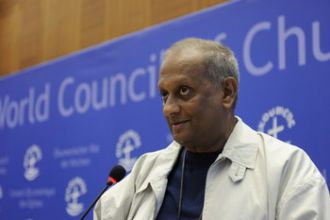UK think-tank sees common ground for churches in heated sexuality debates

The issue of sexuality within the global Christian community can often be divisive and even lead to splits in churches.
The way that churches deal with same-sex relationships and homosexual clergy, or fail to deal with them, can trigger divisions and even schisms.

But the Britain-based think-tank Ekklesia has released a paper that says that churches with different views in heated debates about sexuality actually share common ground and can move forward despite their differences.
The research paper, "Church views on sexuality: recovering the middle ground," released on December 1 is by Savitri Hensman.
Ekklesia says it rejects the popular idea that there are two warring blocks that may be labelled "traditionalists" and "revisionists."
"The churches in Britain and beyond cannot afford to allow themselves to be dragged into many more years of internecine warfare over sexuality," says Ekklesia co-director Simon Barrow.
"Savitri Hensman's paper shows that there is a way forward for the great majority which acknowledges the reality of change, the possibility of mutual recognition, and the benefit of allowing Christian grace rather than fear and suspicion to guide the way differences among churches are handled."
Hensman's paper says this is simplistic and can be misleading as well as unhelpful.
SEVEN VIEWPOINTS
In the new paper, Ekklesia identifies seven widely held viewpoints on sexuality within churches of different denominations and traditions.
It shows that those with supposedly diametrically opposing positions often have more in common than they may at first think - even though they may presently disagree about same-sex relationships, for example.

Equally, it argues, coexistence among those sharing a "middle ground" is not about weak compromise, but instead reflects an approach both deeply rooted in Bible and tradition and open to change as a living community led by the Spirit.
Ekklesia says Bishop Duleep de Chickera, the former Anglican Bishop of Colombo, Sri Lanka, is one of a number of church leaders who have already responded positively to the initiative.
"The seven positions are a fair representation of the spectrum in the Church and its reasoning is clear," de Chickera says. "What I like most is the reconciliatory thrust... A sensible and timely intervention."
It noted Bishop de Chickera preached at the opening service of the Anglican Communion's 2008 Lambeth Conference and spoke at the recent World Council of Churches' 10th Assembly.
The Anglican Bishop of Buckingham, England, the Rev. Alan Wilson, a regular media commentator, has also personally welcomed the paper, adding: "Anything that helps people understand how they relate to this area of concern is good news."
The practical proposal from Ekklesia for reconciliatory moves comes at the same time as the Pilling Report in the Church of England, which recommends some measure of positive accommodation, and processes of reconsideration going on within the Methodist Church, the Church of Scotland (Presbyterian), the Scottish Episcopal Church and others. says Ekklesia